Information injection-pump assembly
BOSCH
9 400 613 478
9400613478
ZEXEL
106671-5065
1066715065
NISSAN-DIESEL
1671396875
1671396875
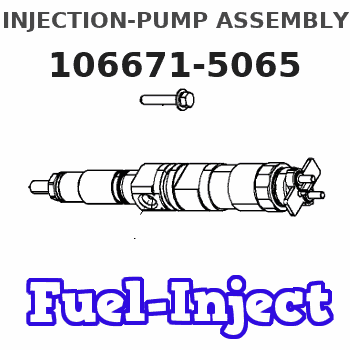
Rating:
Service parts 106671-5065 INJECTION-PUMP ASSEMBLY:
1.
_
7.
COUPLING PLATE
8.
_
9.
_
11.
Nozzle and Holder
1660096605
12.
Open Pre:MPa(Kqf/cm2)
22.6{230}
15.
NOZZLE SET
Include in #1:
106671-5065
as INJECTION-PUMP ASSEMBLY
Cross reference number
BOSCH
9 400 613 478
9400613478
ZEXEL
106671-5065
1066715065
NISSAN-DIESEL
1671396875
1671396875
Zexel num
Bosch num
Firm num
Name
106671-5065
9 400 613 478
1671396875 NISSAN-DIESEL
INJECTION-PUMP ASSEMBLY
PF6T K 14CA INJECTION PUMP ASSY PE6P,6PD PE
PF6T K 14CA INJECTION PUMP ASSY PE6P,6PD PE
Calibration Data:
Adjustment conditions
Test oil
1404 Test oil ISO4113 or {SAEJ967d}
1404 Test oil ISO4113 or {SAEJ967d}
Test oil temperature
degC
40
40
45
Nozzle and nozzle holder
105780-8140
Bosch type code
EF8511/9A
Nozzle
105780-0000
Bosch type code
DN12SD12T
Nozzle holder
105780-2080
Bosch type code
EF8511/9
Opening pressure
MPa
17.2
Opening pressure
kgf/cm2
175
Injection pipe
Outer diameter - inner diameter - length (mm) mm 8-3-600
Outer diameter - inner diameter - length (mm) mm 8-3-600
Overflow valve
132424-0620
Overflow valve opening pressure
kPa
157
123
191
Overflow valve opening pressure
kgf/cm2
1.6
1.25
1.95
Tester oil delivery pressure
kPa
157
157
157
Tester oil delivery pressure
kgf/cm2
1.6
1.6
1.6
Direction of rotation (viewed from drive side)
Right R
Right R
Injection timing adjustment
Direction of rotation (viewed from drive side)
Right R
Right R
Injection order
1-4-2-6-
3-5
Pre-stroke
mm
3.65
3.6
3.7
Beginning of injection position
Drive side NO.1
Drive side NO.1
Difference between angles 1
Cal 1-4 deg. 60 59.5 60.5
Cal 1-4 deg. 60 59.5 60.5
Difference between angles 2
Cyl.1-2 deg. 120 119.5 120.5
Cyl.1-2 deg. 120 119.5 120.5
Difference between angles 3
Cal 1-6 deg. 180 179.5 180.5
Cal 1-6 deg. 180 179.5 180.5
Difference between angles 4
Cal 1-3 deg. 240 239.5 240.5
Cal 1-3 deg. 240 239.5 240.5
Difference between angles 5
Cal 1-5 deg. 300 299.5 300.5
Cal 1-5 deg. 300 299.5 300.5
Injection quantity adjustment
Adjusting point
A
Rack position
11.9
Pump speed
r/min
600
600
600
Average injection quantity
mm3/st.
166.4
164.4
168.4
Max. variation between cylinders
%
0
-4
4
Basic
*
Fixing the lever
*
Boost pressure
kPa
30.7
30.7
Boost pressure
mmHg
230
230
Remarks
Rack limit using stop lever.
Rack limit using stop lever.
Injection quantity adjustment_02
Adjusting point
C
Rack position
7.2+-0.5
Pump speed
r/min
250
250
250
Average injection quantity
mm3/st.
16.7
15.7
17.7
Max. variation between cylinders
%
0
-10
10
Fixing the rack
*
Boost pressure
kPa
0
0
0
Boost pressure
mmHg
0
0
0
Injection quantity adjustment_03
Adjusting point
D
Rack position
9.8
Pump speed
r/min
300
300
300
Average injection quantity
mm3/st.
101.6
95.6
107.6
Fixing the lever
*
Boost pressure
kPa
0
0
0
Boost pressure
mmHg
0
0
0
Boost compensator adjustment
Pump speed
r/min
300
300
300
Rack position
9.8
Boost pressure
kPa
4
4
Boost pressure
mmHg
30
30
Boost compensator adjustment_02
Pump speed
r/min
300
300
300
Rack position
11.5
Boost pressure
kPa
16
14.7
17.3
Boost pressure
mmHg
120
110
130
Boost compensator adjustment_03
Pump speed
r/min
300
300
300
Rack position
11.9
Boost pressure
kPa
17.3
17.3
17.3
Boost pressure
mmHg
130
130
130
Timer adjustment
Pump speed
r/min
750--
Advance angle
deg.
0
0
0
Remarks
Start
Start
Timer adjustment_02
Pump speed
r/min
700
Advance angle
deg.
0.5
Timer adjustment_03
Pump speed
r/min
1050
Advance angle
deg.
1
0.5
1.5
Remarks
Finish
Finish
Test data Ex:
Governor adjustment
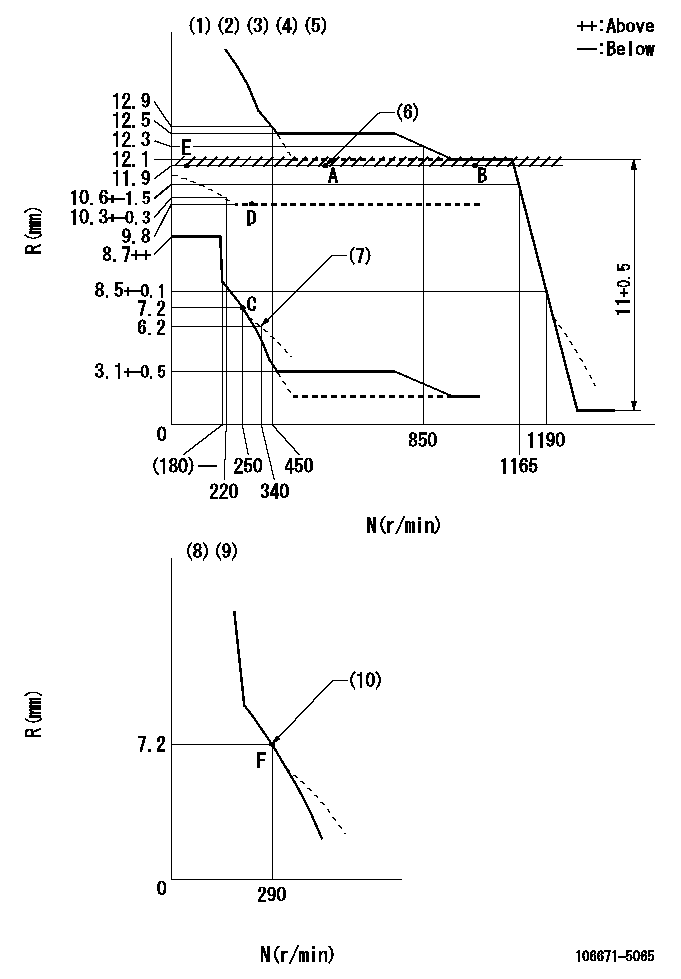
N:Pump speed
R:Rack position (mm)
(1)Maximum - minimum speed specification (using speed lever at adjustment)
(2)Lever ratio: RT
(3)Target shim dimension: TH
(4)Tolerance for racks not indicated: +-0.05mm.
(5)Perform governor adjustment at an ambient temperature of at least 15 deg C (boost compensator start spring is shape memory alloy).
(6)Rack limit using stop lever
(7)Damper spring setting
(8)Variable speed specification: idling adjustment
(9)Fix the lever at the full-load position at delivery.
(10)Main spring setting
----------
RT=1 TH=2.4mm
----------
----------
RT=1 TH=2.4mm
----------
Speed control lever angle
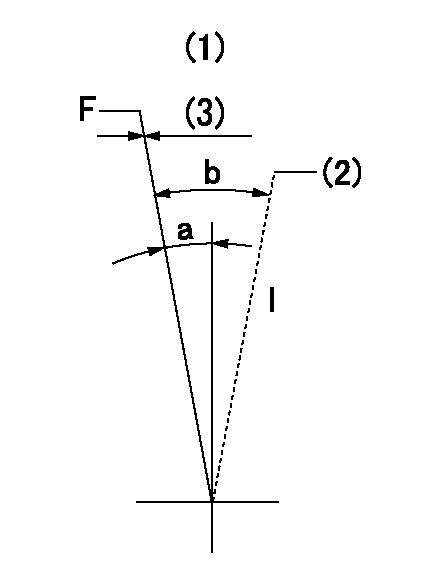
F:Full speed
I:Idle
(1)Base lever only
(2)When pump speed set at aa
(3)Set the stopper bolt (fixed at full-load position at delivery.)
----------
aa=290r/min
----------
a=12deg+-5deg b=21deg+-5deg
----------
aa=290r/min
----------
a=12deg+-5deg b=21deg+-5deg
0000000901
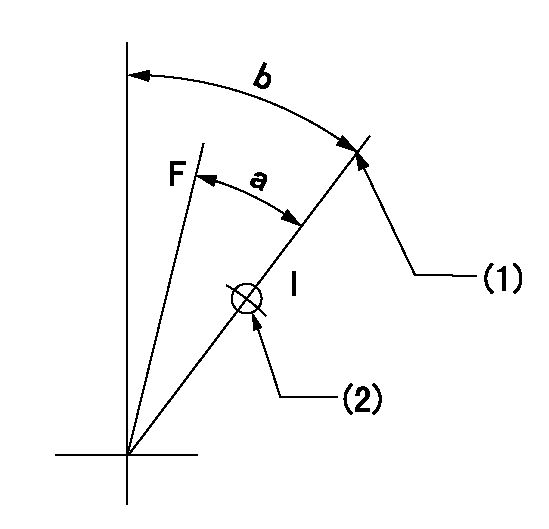
F:Full load
I:Idle
(1)Stopper bolt setting
(2)Use the hole at R = aa
----------
aa=42mm
----------
a=35deg+-3deg b=45deg+-5deg
----------
aa=42mm
----------
a=35deg+-3deg b=45deg+-5deg
Stop lever angle
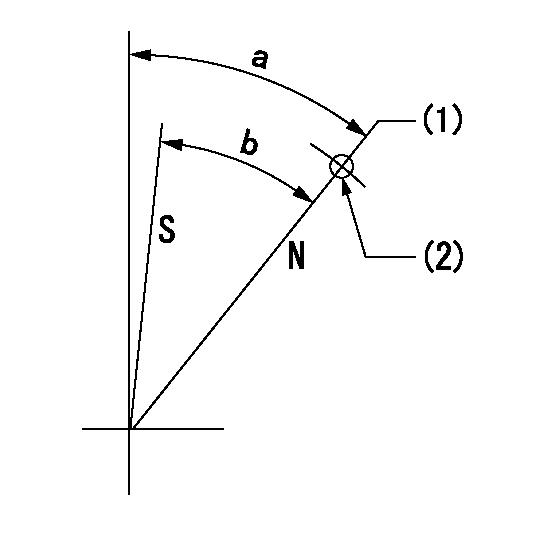
N:Pump normal
S:Stop the pump.
(1)Rack position = aa (set the stopper bolt at point A).
(2)Use the pin at R = bb
----------
aa=11.9mm bb=45mm
----------
a=35deg+-5deg b=35deg+-5deg
----------
aa=11.9mm bb=45mm
----------
a=35deg+-5deg b=35deg+-5deg
Timing setting
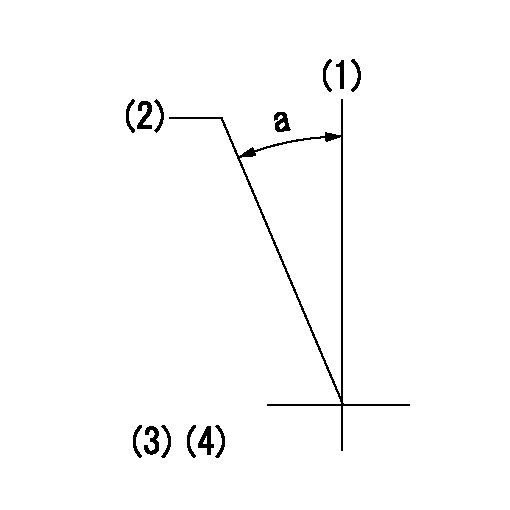
(1)Pump vertical direction
(2)Coupling's key groove position at No 1 cylinder's beginning of injection
(3)-
(4)-
----------
----------
a=(20deg)
----------
----------
a=(20deg)
Information:
Cruise Control On/Off Input Circuit
The cruise control (CC) and power take-off (PTO) ON/OFF input is an ordinary switch. With this switch in the ON position, it is possible to "activate" the cruise control or power take-off mode if other ECM programmed conditions are met.With this switch "open" (or OFF), the input line to the ECM will go to approximately 5 volts. With the switch "closed" (or ON), the input line to the ECM will go to 0 volts (ground).Cruise Control Set/Resume Input Circuit
The cruise control and power take-off set/resume is provided by a three position switch. The switch is used to SET vehicle speed or engine rpm. The function of each position of the switch is as follows:1) CENTER POSITION, the set/resume switch is "open" and all inputs are inactive.2) SET POSITION, after the switch is moved to the SET position and released, the ECM will maintain the existing engine rpm (determining vehicle speed) when the switch was released. If the engine is held in the SET position, the ECM will gradually increase engine rpm (determining vehicle speed) until the switch is released.3) RESUME POSITION, if cruise is deactivated by application of the clutch or service brake, and the switch is then moved to the RESUME position and released, the cruise (PTO) mode is reactivated to the last setting. If the switch is held in the RESUME position, the ECM will gradually decrease engine rpm (determining vehicle speed) until the switch is released.With this switch "open" (or OFF), the input line to the ECM will go to approximately 5 volts. With the switch "closed" (or ON), the input line to the ECM will go to 0 volts (ground).Vehicle Switches Input Circuits
The brake switch is used to deactivate the cruise or PTO modes when the vehicle service brakes are applied. The brake switch is also used to activate the retarder enable output if the service brakes are applied while in cruise mode.The clutch switch is used to deactivate the cruise or PTO modes when the clutch pedal is pressed. The clutch switch is used to DEACTIVATE the retarder enable circuit.With this switch "open" (or OFF), the input line to the ECM will go to approximately 5 volts. With the switch "closed" (or ON), the input line to the ECM will go to 0 volts (ground).Fuel Pressure Input Circuit
Fuel pressure is monitored after the filter by the fuel pressure sensor which is located on the fuel filter housing. The 5 Volt DC operating voltage for this sensor is supplied by the ECM. The output of the fuel pressure sensor is a .5 to 4.5 Volts DC signal. The voltage is dependent upon fuel pressure and is interpreted by the ECM as fuel pressure. If fuel pressure is less than 445 kPa (65 psi) at rated rpm, the "check engine" light is turned on.Engine Electrical System
The electrical system can have three separate circuits: the charging circuit, the starting circuit and the low amperage circuit. Some of the electrical system components are
The cruise control (CC) and power take-off (PTO) ON/OFF input is an ordinary switch. With this switch in the ON position, it is possible to "activate" the cruise control or power take-off mode if other ECM programmed conditions are met.With this switch "open" (or OFF), the input line to the ECM will go to approximately 5 volts. With the switch "closed" (or ON), the input line to the ECM will go to 0 volts (ground).Cruise Control Set/Resume Input Circuit
The cruise control and power take-off set/resume is provided by a three position switch. The switch is used to SET vehicle speed or engine rpm. The function of each position of the switch is as follows:1) CENTER POSITION, the set/resume switch is "open" and all inputs are inactive.2) SET POSITION, after the switch is moved to the SET position and released, the ECM will maintain the existing engine rpm (determining vehicle speed) when the switch was released. If the engine is held in the SET position, the ECM will gradually increase engine rpm (determining vehicle speed) until the switch is released.3) RESUME POSITION, if cruise is deactivated by application of the clutch or service brake, and the switch is then moved to the RESUME position and released, the cruise (PTO) mode is reactivated to the last setting. If the switch is held in the RESUME position, the ECM will gradually decrease engine rpm (determining vehicle speed) until the switch is released.With this switch "open" (or OFF), the input line to the ECM will go to approximately 5 volts. With the switch "closed" (or ON), the input line to the ECM will go to 0 volts (ground).Vehicle Switches Input Circuits
The brake switch is used to deactivate the cruise or PTO modes when the vehicle service brakes are applied. The brake switch is also used to activate the retarder enable output if the service brakes are applied while in cruise mode.The clutch switch is used to deactivate the cruise or PTO modes when the clutch pedal is pressed. The clutch switch is used to DEACTIVATE the retarder enable circuit.With this switch "open" (or OFF), the input line to the ECM will go to approximately 5 volts. With the switch "closed" (or ON), the input line to the ECM will go to 0 volts (ground).Fuel Pressure Input Circuit
Fuel pressure is monitored after the filter by the fuel pressure sensor which is located on the fuel filter housing. The 5 Volt DC operating voltage for this sensor is supplied by the ECM. The output of the fuel pressure sensor is a .5 to 4.5 Volts DC signal. The voltage is dependent upon fuel pressure and is interpreted by the ECM as fuel pressure. If fuel pressure is less than 445 kPa (65 psi) at rated rpm, the "check engine" light is turned on.Engine Electrical System
The electrical system can have three separate circuits: the charging circuit, the starting circuit and the low amperage circuit. Some of the electrical system components are
Have questions with 106671-5065?
Group cross 106671-5065 ZEXEL
Nissan-Diesel
Nissan-Diesel
106671-5065
9 400 613 478
1671396875
INJECTION-PUMP ASSEMBLY
PF6T
PF6T